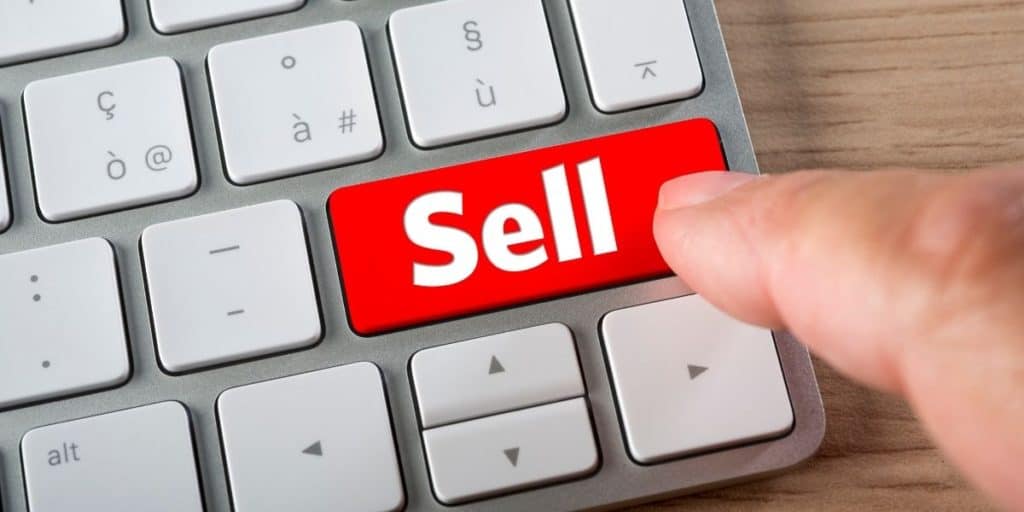The stock market is an integral part of investment strategies around the world. People rely on it to grow their money and stave off the effects of inflation. But what happens when you buy a stock and where does the money go?
When you buy a stock, the money either goes to the issuing company, if you bought during an IPO, or directly to the seller if you’re buying from the secondary market. The investment bank or brokers that arrange the purchase either in an IPO or through the secondary market will also deduct fees.
The rest of the article will cover all you need to know about how your money moves in the stock market. You’ll see what happens at every stage of your purchase. Remember that we’re talking about buying real shares in this article and not buying CFDs or similar synthetic products.
IMPORTANT SIDENOTE: I surveyed 1500+ traders to understand how social trading impacted their trading outcomes. The results shocked my belief system! Read my latest article: ‘Exploring Social Trading: Community, Profit, and Collaboration’ for my in-depth findings through the data collected from this survey!
Table of Contents
Where Does Your Money Go When You Buy Stocks?
When you buy stocks in any company, you start by transferring money from your bank account linked to your brokerage. Once you initiate a purchase, the money will be debited from your account, and you’ll get the equivalent amount of shares. If you don’t have enough money to buy a full share, you’ll get the fraction your money can pay for.

So, what happens to the money that left your account? Two things can happen with the money, and the exact path it’ll go down depends on how you bought your stock.
The Initial Public Offering (IPO) Pathway
Buying stock through an IPO is a fairly straightforward transaction.
As the buyer, you’re paying the company to own a piece of their pie. The company collects the money, and you get some shares in return. The organizer of the IPO, typically an investment bank, will take a cut of the money, but the company gets the bulk of the money you paid for the share(s) you just bought.
Companies engage in IPOs because it helps them raise money as they transition from privately controlled to publicly traded. When the IPO is successful, the company uses the money collected from people like you to improve its business operations.
They’ll hire more staff, build new factories, launch new products, and implement any other strategies that will help grow the business. So, the money you pay when buying a stock in an IPO will improve the business’s operations.
Companies that issue IPOs don’t owe you any money.
Once the IPO is completed, the shares you purchased are yours to use as you please. You can hold onto them for as long as you want or resell them in the secondary market.
The Secondary Market Pathway
Once a company completes an IPO, its shares can only be bought or sold in the secondary market. When you think about the stock market, you’re referring to the secondary market. Here, you can buy and sell shares to and from other investors.
The secondary market is powered by exchanges like the New York Stock Exchange. If you bought stock in any company and weren’t a part of their IPO, you bought shares from the secondary market.
The money you spend in the secondary market doesn’t go to the company.
Instead, it goes to the investor that sold you the shares. So, if you buy Apple shares, the money won’t get to Apple. It’ll go to whoever sold you the number of shares you bought after the transaction fees are deducted.
The stock exchanges exist for the sole purpose of matching people like you looking to buy stock to sellers looking to offload some of theirs to book a profit or loss.
How a Stock Price Drop Affects Your Money?
Now you know what happens to your money when you buy a stock. What’s happening to your money when you have the stock and the price per share starts to drop?
If you’re holding the stock and the price starts to drop, you’re not losing any money. Remember, you are holding stock and not money. You’re only looking at the value of the specific stock drop. If you don’t sell your stock when the price is below the value you bought it, you haven’t lost anything.
If you sell the stock at this time, then you’ve lost money (cost of purchase-total received from sale). The money you lost is with the original seller you bought the stock from.
The stock market is complicated from the outside, but in reality, it’s just a market where people buy shares, hoping that someone will be willing to pay a higher price for the shares in the future. If that expectation comes to pass, you’ve made a profit. If it doesn’t, and you need to sell and recover some money, you’ve booked a loss.
The investors that buy the stocks from you when the share price is crashing believe that the stock is undervalued and will appreciate in the future, and on it goes. Someone will always end up on the winning or losing side of a stock trade in the secondary market.
What Does It Mean To Own a Stock?
Owning a stock means you’re an investor in the “common stock” of the underlying company. You’ll have voting rights as a common stock owner, and you’re qualified to receive dividends.
As a stock owner, you have a share in the company’s profits or losses. It doesn’t give you a say in managerial decisions, and you won’t get office space within the company.
Do Investments in Stocks Guarantee Profits?
Stocks have a good record of delivering high returns to investors, but they don’t offer guaranteed profits. The best way to increase your chances of profits with stocks is to maintain a diversified portfolio.
When your stock holdings are properly diversified, the positive performance from one stock can balance out negative performance from another.
As a shareholder in any company, you believe that the company’s value and its share price will continue on an upward trajectory for the duration you expect to hold the stocks. However, the share price never goes up in a straight line.
There will be periods of downturns in between.
Holding your stock with a long-term view will help you ignore these short-term volatility-induced fluctuations.
When Is the Right Time To Sell a Stock?
The right time to sell a stock is a subjective decision. Look at your reason for buying the stock and the company’s overall health. If you bought the stock as a part of your long-term investment strategy, you should only sell when your goal for the investment has been achieved.
For example, if you made the investment years ago to help raise money to deposit for a house or pay tuition for your child, you should never sell until it’s time for any of those events.
However, if the company has hit bad times due to an event or a permanent shift in the global economy, it may be a good idea to sell. For example, main street stores are quickly disappearing due to the rise of the internet and eCommerce.
It may be a good idea to sell off your shares in these businesses if you don’t believe they can continue to withstand the onslaught from online businesses.
Author’s Recommendations: Top Trading and Investment Resources To Consider
Before concluding this article, I wanted to share few trading and investment resources that I have vetted, with the help of 50+ consistently profitable traders, for you. I am confident that you will greatly benefit in your trading journey by considering one or more of these resources.
- Roadmap to Becoming a Consistently Profitable Trader: I surveyed 5000+ traders (and interviewed 50+ profitable traders) to create the best possible step by step trading guide for you. Read my article: ‘7 Proven Steps To Profitable Trading’ to learn about my findings from surveying 5000+ traders, and to learn how these learnings can be leveraged to your advantage.
- Best Broker For Trading Success: I reviewed 15+ brokers and discussed my findings with 50+ consistently profitable traders. Post all that assessment, the best all round broker that our collective minds picked was M1 Finance. If you are looking to open a brokerage account, choose M1 Finance. You just cannot go wrong with it! Click Here To Sign Up for M1 Finance Today!
- Best Trading Courses You Can Take For Free (or at extremely low cost): I reviewed 30+ trading courses to recommend you the best resource, and found Trading Strategies in Emerging Markets Specialization on Coursera to beat every other course on the market. Plus, if you complete this course within 7 days, it will cost you nothing and will be absolutely free! Click Here To Sign Up Today! (If you don’t find this course valuable, you can cancel anytime within the 7 days trial period and pay nothing.)
- Best Passive Investment Platform For Exponential (Potentially) Returns: By enabling passive investments into a Bitcoin ETF, Acorns gives you the best opportunity to make exponential returns on your passive investments. Plus, Acorns is currently offering a $15 bonus for simply singing up to their platform – so that is one opportunity you don’t want to miss! (assuming you are interested in this platform). Click Here To Get $15 Bonus By Signing Up For Acorns Today! (It will take you less than 5 mins to sign up, and it is totally worth it.)

Conclusion
The money you spend when purchasing stock will either go to the company or the investor who sold it to you. In most cases, it’s the latter, unless you’ve bought the stock during an IPO. Don’t forget that the brokers will take their cut of the purchase.
However, the destination of your money doesn’t impact your potential profits or losses.
BEFORE YOU GO: Don’t forget to check out my latest article – ‘Exploring Social Trading: Community, Profit, and Collaboration’. I surveyed 1500+ traders to identify the impact social trading can have on your trading performance, and shared all my findings in this article. No matter where you are in your trading journey today, I am confident that you will find this article helpful!
Affiliate Disclosure: We participate in several affiliate programs and may be compensated if you make a purchase using our referral link, at no additional cost to you. You can, however, trust the integrity of our recommendation. Affiliate programs exist even for products that we are not recommending. We only choose to recommend you the products that we actually believe in.
Recent Posts
Exploring Social Trading: Community, Profit, and Collaboration
Have you ever wondered about the potential of social trading? Well, that curiosity led me on a fascinating journey of surveying over 1500 traders. The aim? To understand if being part of a trading...
Ah, wine investment! A tantalizing topic that piques the curiosity of many. A complex, yet alluring world where passions and profits intertwine. But, is it a good idea? In this article, we'll uncork...
